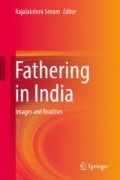Abstract
It is a well-established fact that fathers have a direct influence on child’s upbringing and personality, with a number of empirical evidences as proof. However bidirectional models stressing the co-occurrence of both the directions of influence – from parent to child and child to parent in a complex reciprocal system – are of a more recent origin. I attempted to explore the factors that lead to transformation in men during the course of involved fathering, through in-depth interviews with 30 involved fathers, who currently lived in the city of Vadodara. The conceptual framework proposed by Palkovitz (1996) and the principles of grounded theory guided this study. Majority of the fathers reported that their commitment to family has increased in the course of involved fathering. The fathers also reflected that commitment to fathering role is the factor that induced maximum changes in them. The theoretical processes like socialisation from child to parent, role person merger and realisation of possible self and modelling and reinforcement were also reflected by parents as a stimuli to bring alterations in their life.
Access this chapter
Tax calculation will be finalised at checkout
Purchases are for personal use only
References
Ann, A. L. P. (2010, June). Men’s transition to fatherhood: An overview of first-time fathers’ experience’s with fathering, marriage and work-life issues. In W. Marsiglow (Chair) Symposium conducted on fatherhood in the 21st century Asia: Research, interventions and policies. Symposium Conducted at Faculty of Arts and Social Sciences, National University of Singapore.
Cast, A. D. (2004). Well being and the transitions to parenthood: An identity theory approach. Sociological Perspectives, 47(1), 55–78.
Daly, K. J., Ashbourne, L., & Brown, J. L. (2008). Fathers’ perceptions of children’s influence: Implications for involvement. The Annals of the American Academy of Political and Social Science, 624(1), 61–77.
Eggebeen, D. J., & Knoester, C. (2001). Does fatherhood matter for men? Journal of Mairraige and Family, 63(2), 381–393.
Eggebeen, D. J., Dew, J., & Knoester, C. (2009). Fatherhood and men’s lives at middle age. Journal of Family Issues, 31(1), 113–130.
Hawkins, A. J., Christiansen, S. L., Sargent, K. P., & Hill, J. E. (1995). Rethinking fathers involvement in child care: A development perspective. In W. Marsiglio & W. Marsiglo (Eds.), Fatherhood: Contemporary theory, research and social policy (pp. 42–56). Thousand Oaks: SAGE Publications.
Knoester, C., & Eggebeen, D. J. (2006). The effects of the transition to parenthood and subsequent children on men’s well-being and social participation. Journal of Family Relations, 27(11), 1532–1560.
Levinson, D. J. (1978). The seasons of a man’s life. New York: Ballantine Books.
Markus, H., & Nurius, P. (1986). Possible selves. American Psychologist, 41(9), 954–969. https://doi.org/10.1037/0003-066X.41.9.954.
McAdams, D. P. (2001). Generativity in midlife. In M. Lachman (Ed.), Handbook of midlife development (pp. 395–443). New York: Wiley.
Mol, J. D., & Buysse, A. (2008). Understandings of children’s influence in parent-child relationships: A Q-methodological study. Journal of Social and Personal Relationships, 25(2), 359–379.
Palkovitz, R. (1996a). Reconstructing “involvement”: Expanding conceptualization of men’s caring in contemporary families. In A. J. Hawkins & D. C. Dollahite (Eds.), Generative fathering: Beyond deficit perspective (Vol. 3, pp. 200–216). Thousand Oaks: SAGE Publications.
Palkovitz, R. (1996b). Parenting as a generator of adult development: Conceptual issues and implications. Journal of Social and Personal Relationships, 13(4), 571–592.
Palkovitz, R. (2002). Involved fathering and men’s adult development. Mahwah: Lawrence Erlbaum Associates, Publishers.
Palm, G., & Palkovitz, R. (2009). Transitions within fathering. Fathering: A Journal of Theory, Research and Practice about men as fathers, 7(1), 3–22.
Pleck, J. H. (1985). Working wives/working husbands. Beverly Hills: Sage Publications.
Rane, T. R., & McBride, B. A. (2000). Identity theory as a guide to understanding fathers’ involvement with their children. Journal of Family Issues, 21(3), 347–366.
Rothrauff, T., & Cooney, T. M. (2008). The role of generativity in psychological well-being: Does it differ for childless adults and parents. Journal of Adult Development, 3, 148–159.
Sandhu, K. (2003). Demystifying fatherhood: Variation with ages of children. Unpublished M.Phil dissertation, Department of Human Development and Family studies, M.S. University of Baroda, Baroda.
Snarey, J. (1993). How fathers care for the next generation: A four decade story. London: Harvard University Press.
Sriram, R. (2003). Subjective experiences of fatherhood and motherhood: Realities and reflections. Unpublished PhD dissertation, Department of Human Development and Family studies, M.S. University of Baroda, Baroda.
Stelle, C. D., & Sheehan, N. W. (2011). Exploring paternal maturity in the relationships between older fathers and adult children. International Journal of Aging and Human Development, 72, 45–65.
Stryker, S. (1987). Identity theory: Developments and extensions. In K. Yardley & T. Honess (Eds.), Self and identity: Psychosocial perspectives (pp. 89–103). New York: Wiley.
Turner, R. H. (1978). The role and the person. American Journal of Sociology, 84(1), 1–23.
Author information
Authors and Affiliations
Corresponding author
Editor information
Editors and Affiliations
Rights and permissions
Copyright information
© 2019 Springer Nature Singapore Pte Ltd.
About this chapter
Cite this chapter
Kaur, A. (2019). My Child Transformed Me: Reflections of Involved Fathers. In: Sriram, R. (eds) Fathering in India. Springer, Singapore. https://doi.org/10.1007/978-981-13-1715-6_9
Download citation
DOI: https://doi.org/10.1007/978-981-13-1715-6_9
Published:
Publisher Name: Springer, Singapore
Print ISBN: 978-981-13-1714-9
Online ISBN: 978-981-13-1715-6
eBook Packages: Social SciencesSocial Sciences (R0)

